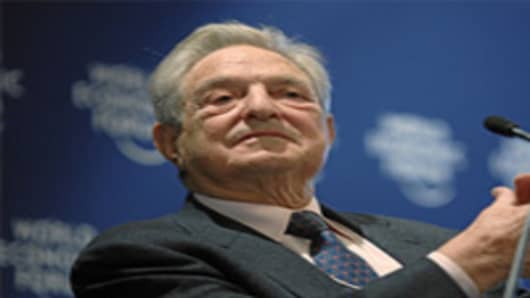The financial crisis is far from over, and regulators need to crack down on investors' tendency to misuse derivatives, global financier George Soros said at a conference in Vienna.
“We have just entered Act Two of the drama… when the financial markets started losing confidence in the credibility of sovereign debt,” he said.
Soros is founder and chairman of the Open Society Institute, and chairman of Soros Fund Management.
He is ranked No. 35 on Forbes 2010 “Rich List,” with net assets of approximately $14 billion.
His recommendations for escaping the global crisis place a great deal of responsibility on regulators. “Regulators ignored systemic risks. The positions of all market participants – hedge funds and sovereign wealth funds – need to be monitored.”
Back in April, he wrote in the Financial Times, “It will be the task of regulators to understand derivatives and synthetic securities and refuse to allow their creation if they cannot fully evaluate their systemic risks.
He added, "That task cannot be left to investors, contrary to the diktats of the market fundamentalist dogma that prevailed until recently.”
Perils of Derivatives
Soros launched a thorough attack on derivatives and synthetic securities, questioning their overall usefulness.
In April, he wrote that the instruments had been used to “create imaginary value out of thin air.” He discouraged the securitization of loans .“Securitization separates interest of securers from interest of principals,” and particuarly credit default swaps , he said .
“Credit default swaps are particularly dangerous,” Soros said. “CDS ought to be available only to the extent that the buyers have legitimate insurable interest.”
Earlier this year, Soros wrote that CDS “Can be used to mount bear raids; in addition to insurance they also provide a license to kill.” Derivatives serve useful functions but “also have many risks,”Soros said, because they can pile up hidden imbalances in supply or demand which may come as a shock to investors.
Registering derivatives traded on exchanges would be a simple, but effective way to cure the problem and promote stability in the financial system, according to Soros, because the registration process - laborious and time-consuming - would discourage the use of opaque over-the-counter derivatives.
Soros admitted that, “It’s probably impossible to separate commercial and investment banking,” like in 1933, but he went on to highlight parallels between today’s economic situation and that of the Great Depression.
“We find ourselves in a situation eerily reminiscent of the 1930s. Keynes has taught us budget deficits are essential for counter-cyclical policies, yet many governments have to reduce them under pressure from financial markets. This is liable to push the global economy into a double-dip.”


